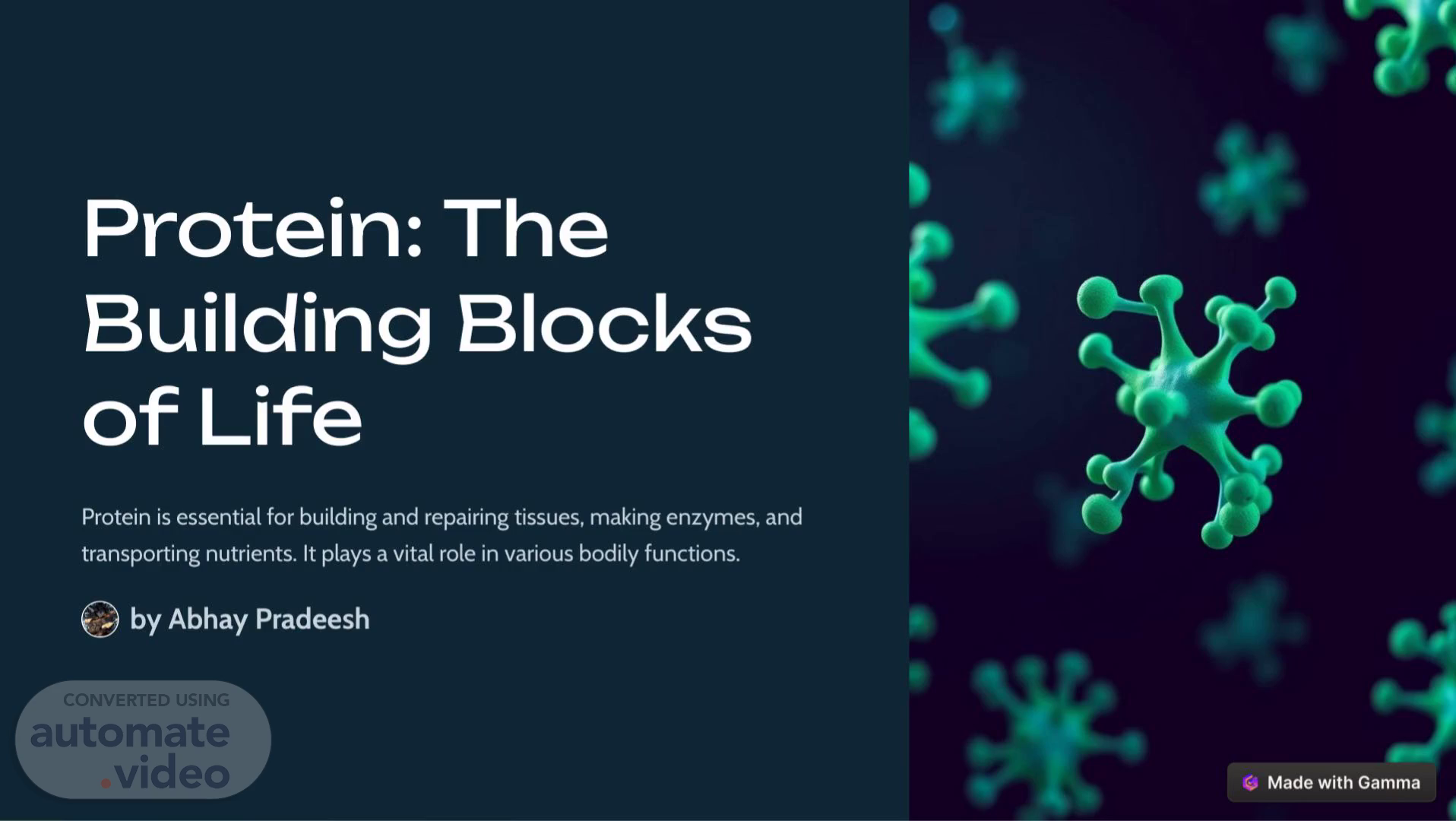Scene 1 (0s)
[Audio] Protein is the foundation of life, being essential for building and repairing tissues, making enzymes, and transporting nutrients. In addition, it plays a vital role in various bodily functions..
Scene 2 (14s)
[Audio] Protein is a macromolecule, essential for life. It is a complex molecule composed of amino acids linked together in long chains, forming a vital component of every cell in our body, performing crucial functions. The building blocks of proteins are amino acids, which are organic compounds. These amino acids are the foundation of proteins, allowing them to perform their various roles in the body..
Scene 3 (42s)
[Audio] Protein plays a crucial role in the body's ability to repair and rebuild tissues, including muscle, skin, and bone. This process involves the production of enzymes that catalyze chemical reactions within the body. Additionally, protein is essential for the development of antibodies that help fight off infections and diseases. Furthermore, it plays a key role in hormone regulation, ensuring that various bodily functions are properly regulated..
Scene 4 (1m 10s)
[Audio] Legumes, meat, nuts, poultry, seeds, fish, eggs, and dairy products contain complete proteins, meaning they have all nine essential amino acids that our bodies need. Grains, however, are incomplete proteins, lacking one or more essential amino acids. This information is crucial for individuals who want to ensure they get enough protein in their diet..
Scene 5 (1m 36s)
[Audio] Protein is obtained from both animal and plant sources. These include meat, poultry, fish and seafood, eggs, dairy products, legumes, nuts, seeds, soy products, quinoa, and tofu. A well-balanced diet should incorporate a variety of these sources to ensure adequate protein intake..
Scene 6 (2m 0s)
[Audio] Protein is essential for various bodily functions, including building and repairing tissues, making enzymes, and transporting nutrients. To ensure optimal functioning, it's crucial to consume the right amount of protein. The recommended daily protein intake varies depending on age, activity level, and other factors. As individuals grow older, their protein needs change, with older adults requiring less protein than younger adults. On the other hand, those who engage in regular exercise or strenuous activities require more protein to support muscle growth and repair. Additionally, certain health conditions may necessitate adjustments to protein intake, as determined by a healthcare professional. By understanding these variations, we can better tailor our diets to meet our unique nutritional needs..
Scene 7 (2m 54s)
[Audio] Protein plays a crucial role in weight management. When you consume adequate amounts of protein, it helps you feel fuller for longer, reducing cravings and preventing overeating. This is because protein takes more energy to digest than carbohydrates or fats, boosting your metabolism. Additionally, protein helps maintain muscle mass during weight loss, preventing muscle loss and promoting a healthy body composition..
Scene 8 (3m 23s)
[Audio] Protein is the primary building block for muscle tissue, essential for growth and repair. Adequate protein intake supports strength training and endurance activities by promoting muscle recovery and growth. Furthermore, sufficient protein consumption can enhance athletic performance by supporting muscle function and reducing muscle breakdown..
Scene 9 (3m 47s)
[Audio] As we age, it's crucial to maintain our bone health and muscle mass. Protein plays a significant role in this process, helping to preserve bone density and reduce the risk of osteoporosis. Additionally, adequate protein intake can also support cognitive function and memory, promoting overall brain health. This highlights the importance of incorporating sufficient protein into our diet as we age, enabling us to maintain our physical and mental well-being..
Scene 10 (4m 15s)
[Audio] Protein is an essential nutrient for overall health and well-being. By incorporating a variety of protein sources into a balanced diet, one can support various bodily functions and maintain optimal health throughout one's life..
